No doubt that Africa needs what China offers
by Xhanti Payi,
2015-12-09 05:49:52.0
DESPITE his many political and philosophical detractors, Henry Kissinger is one of the few authoritative voices on China. Having served as a key US diplomat during a time when China was reinventing herself to what she is today, Kissinger has had a perspective few other analysts have today.
His views on China are not inconsistent with the China we see, in the ways in which it responds to global debates and tensions. One need only look at the way China votes at the United Nations Security Council to understand its posture on affairs of other nations. In his book, On China, Kissinger is seemingly at pains to show that, unlike the US, China is not interested in exporting its values or owning culture and territories outside itself — that even though it may seek to be a leading civilisation, it does so not through an effort to export its values, but to sustain them even in what Kissinger himself calls the "new world order".
He recounts the China of old, reflecting that in official Chinese records, foreign envoys did not come to the imperial court to engage in negotiations or affairs of state: they came "to be transformed" by the emperor’s civilising influence.
The emperor did not hold "summit meetings" with other heads of state; instead, audiences with him represented the "tender cherishing of men from afar", who brought tribute to recognise his overlordship. When the Chinese court deigned to send envoys abroad, they were not diplomats, but "heavenly envoys" from the Celestial Court.
This may seem like an old China, but modern China presents the same posture, albeit in a different paradigm.
From sharing its strategies on growth to discussing its approaches to corruption, China is open to those who wish to dip into the reservoir, but it is not particularly keen to advertise its views or supply the world with its values and culture.
If this is accepted, it is curious that so many regarded the summit held in Sandton last week as "China’s scramble for Africa" or "China takes up from where the West left off". The public sentiment on China reinforces two notions. First, that Africa remains a vulnerable, almost pitiful, player in trade and investment negotiations, freely open to the ravages of nefarious nations with money. Second, it represents a misreading of global political and economic conditions as they exist today, and thus Africa’s unique position of strength.
The tensions in the Middle East, compounded by frosty relations between the West and many other regions, have complicated economic diplomacy a great deal. Trade and investment relations amid geopolitics make for less than optimal outcomes. It doesn’t help that Europe, and even Japan, all which have been close economic partners to China, face continually tough economic conditions.
There are really very few other places to look for China to improve her economic fortunes. China also knows that in Africa, she has an economic and diplomatic partner that is not too keen to impose its views on China’s social order. Not only is China looking to Africa for opportunity, it realises that it has competition, having seen African heads of state head to India to listen to that nation’s sales pitch.
The $64bn package prepared by China shows just how far it will go to promote itself and gain business advantage over anyone else. There is also no question that Africa needs China, as a market for both minerals and manufactured goods. Africa also needs Chinese expertise in industry and infrastructural development.
Most of all — as China well knows — Africa needs Chinese money to plug the vast financial deficit preventing Africa from building the infrastructure that is so critical for growth and development.
So, leaving behind the old talk of colonisation and exploitation, Africa has one thing to do: recognise its power to negotiate for a good and sustainable deal. That must be preceded by Africa’s extensive plan and thus outline of its own need and bargaining chips.
While visiting Mexico, another developing nation, in 2009, Chinese president Xi Jinping made remarks that are important to consider if we are to be comfortable in dealing with China: "Some foreigners with full bellies and nothing better to (do) engage in finger pointing at us. First, China does not export revolution; second, it does not export famine and poverty; and third, it does not mess around with you. So what else is there to say?"
The year is 2015. The question cannot be whether China wants to exploit Africa, but how Africa can benefit itself from relating with the world’s second-largest economy, which has come knocking at her door.
• Payi is an economist and head of research at Nascence Advisory and Research
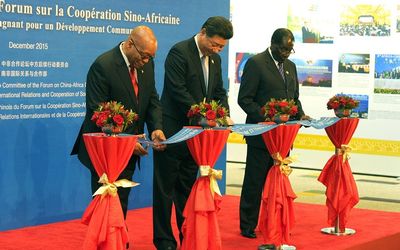
President Jacob Zuma, Chinese President Xi Jinping and Zimbabwean President Robert Mugabe cut the ribbon to mark the opening of an exhibition in Johannesburg. Picture: KOPANO TLAPE
DESPITE his many political and philosophical detractors, Henry Kissinger is one of the few authoritative voices on China. Having served as a key US diplomat during a time when China was reinventing herself to what she is today, Kissinger has had a perspective few other analysts have today.
His views on China are not inconsistent with the China we see, in the ways in which it responds to global debates and tensions. One need only look at the way China votes at the United Nations Security Council to understand its posture on affairs of other nations. In his book, On China, Kissinger is seemingly at pains to show that, unlike the US, China is not interested in exporting its values or owning culture and territories outside itself — that even though it may seek to be a leading civilisation, it does so not through an effort to export its values, but to sustain them even in what Kissinger himself calls the "new world order".
He recounts the China of old, reflecting that in official Chinese records, foreign envoys did not come to the imperial court to engage in negotiations or affairs of state: they came "to be transformed" by the emperor’s civilising influence.
The emperor did not hold "summit meetings" with other heads of state; instead, audiences with him represented the "tender cherishing of men from afar", who brought tribute to recognise his overlordship. When the Chinese court deigned to send envoys abroad, they were not diplomats, but "heavenly envoys" from the Celestial Court.
This may seem like an old China, but modern China presents the same posture, albeit in a different paradigm.
From sharing its strategies on growth to discussing its approaches to corruption, China is open to those who wish to dip into the reservoir, but it is not particularly keen to advertise its views or supply the world with its values and culture.
If this is accepted, it is curious that so many regarded the summit held in Sandton last week as "China’s scramble for Africa" or "China takes up from where the West left off". The public sentiment on China reinforces two notions. First, that Africa remains a vulnerable, almost pitiful, player in trade and investment negotiations, freely open to the ravages of nefarious nations with money. Second, it represents a misreading of global political and economic conditions as they exist today, and thus Africa’s unique position of strength.
The tensions in the Middle East, compounded by frosty relations between the West and many other regions, have complicated economic diplomacy a great deal. Trade and investment relations amid geopolitics make for less than optimal outcomes. It doesn’t help that Europe, and even Japan, all which have been close economic partners to China, face continually tough economic conditions.
There are really very few other places to look for China to improve her economic fortunes. China also knows that in Africa, she has an economic and diplomatic partner that is not too keen to impose its views on China’s social order. Not only is China looking to Africa for opportunity, it realises that it has competition, having seen African heads of state head to India to listen to that nation’s sales pitch.
The $64bn package prepared by China shows just how far it will go to promote itself and gain business advantage over anyone else. There is also no question that Africa needs China, as a market for both minerals and manufactured goods. Africa also needs Chinese expertise in industry and infrastructural development.
Most of all — as China well knows — Africa needs Chinese money to plug the vast financial deficit preventing Africa from building the infrastructure that is so critical for growth and development.
So, leaving behind the old talk of colonisation and exploitation, Africa has one thing to do: recognise its power to negotiate for a good and sustainable deal. That must be preceded by Africa’s extensive plan and thus outline of its own need and bargaining chips.
While visiting Mexico, another developing nation, in 2009, Chinese president Xi Jinping made remarks that are important to consider if we are to be comfortable in dealing with China: "Some foreigners with full bellies and nothing better to (do) engage in finger pointing at us. First, China does not export revolution; second, it does not export famine and poverty; and third, it does not mess around with you. So what else is there to say?"
The year is 2015. The question cannot be whether China wants to exploit Africa, but how Africa can benefit itself from relating with the world’s second-largest economy, which has come knocking at her door.
• Payi is an economist and head of research at Nascence Advisory and Research


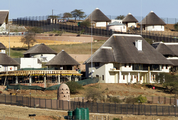

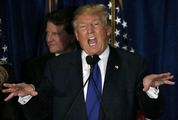

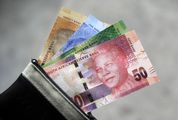

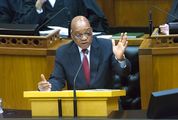
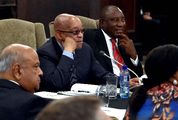
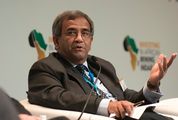









Change: 0.68%
Change: 0.94%
Change: 2.35%
Change: 1.01%
Change: -1.80%
Data supplied by Profile Data
Change: 1.24%
Change: -0.08%
Change: 0.68%
Change: 0.00%
Change: -0.07%
Data supplied by Profile Data
Change: -1.23%
Change: -1.06%
Change: -1.50%
Change: -1.01%
Change: -0.45%
Data supplied by Profile Data
Change: -0.47%
Change: -1.18%
Change: -0.66%
Change: -1.36%
Change: 0.58%
Data supplied by Profile Data